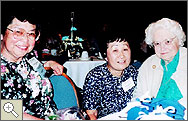
To Elizabeth Kikuchi Yamada, the correspondent who inherited the Miss Breed collection, the great achievement of the Japanese Americans was that most were able to overcome their pain and fear after the war and "do what they needed to do" to rebuild their lives. She believes that the letters, with their general good cheer, show the particular resilience of the young people.
"It's wonderful to see how they deal with adversity," she said. "If you live in a circle of love and community, you can have a happy childhood."
Ms. Yamada, a retired high school English teacher, was eleven at the time of the evacuation. Something that helped her through the experience was the continued friendship of Miss Breed, whom she came to regard as a role model. In the camp, she would "play library" by inviting other children into her room to borrow books that Miss Breed sent.
"How much poorer our lives would have been without those books," she said. "You're stuck in this isolated place, and you're considered the enemy, but you're reading Black Beauty or Little House on the Prairie , the same things that any American kid would be reading. Books weren't an escape. Books brought the outside world to us."
Clara Breed held the position of city librarian of San Diego from 1946 until her retirement in 1971. She stayed in touch with many of her correspondents until her death in 1994, but was especially close to Katherine Tasaki Segawa, who went into camp at the age of ten and died in 1993. Ben Segawa, Katherine's husband, still sees Miss Breed's influence all around him.
"She was the one who introduced my wife to books, and Kathy's love for books was passed on to all four of our children," he said. "My son is the senior minister of his church. The other ministers tell me he is an outstanding writer. I've got a granddaughter who's nine years old, and she's constantly reading. I'm one of those guys who barely got out of high school. They sure didn't get it from me!"
The Miss Breed collection does not include much of Clara Breed's own writing, but she can be glimpsed in reflection in nearly everything her correspondents wrote. Most of the letters contain a note of thanks to her — for sending the books and other presents, for coming to visit the camp, or just for showing concern by asking questions.
Her devotion to her friends is also evident in the fact that she kept the letters for all of her long life. The thoughts of a group of young people — informally stated and often dashed off — are now part of the history of a time remembered by fewer and fewer people. Ms. Yamada donated the collection to the Japanese American National Museum so that it would be available to anyone studying the internment episode. As she said, "You can't always get a true picture from the outside looking in."
|
 |
 |
 |

Three days ago I went washing with my mother...When I reached home my sister ran to me and said we got another book from Miss Breed. I was so happy because I didn’t expect to get another book from you. I ran into the house forgetting how tired and hot I was.
--ELIZABETH KIKUCHI
|
 |
 |
 |
 |
 |
 |

Katherine Tasaki Segawa, Louise Ogawa, and Clara Breed at a 1991 Poston Camp III reunion held in San Diego
|
 |
 |
 |
|

